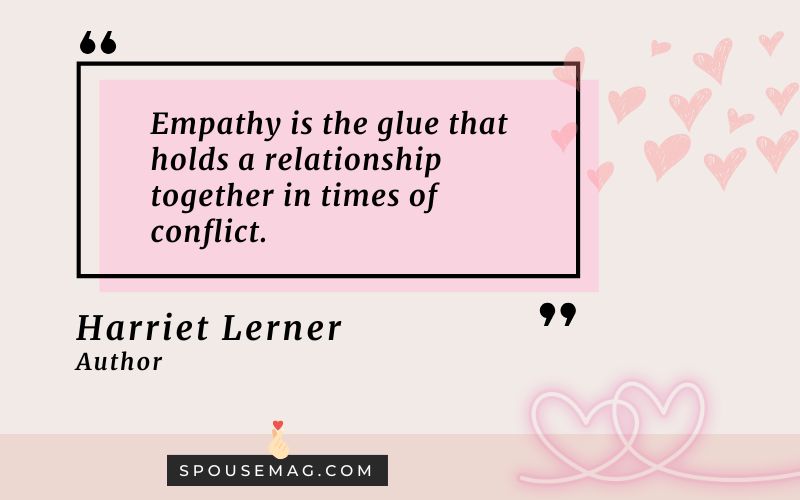When I first picked up Marriage Rules by Harriet Lerner, I thought it would be just another typical relationship guide. But as I got into it, I discovered that this book brings a fresh and insightful perspective on marriage.
The book boldly asserts that the key to a happier marriage isn’t fixing your partner but becoming the best version of yourself. It’s about rediscovering the importance of empathy and navigating the complexities of sex, intimacy, and respect.
As someone who has spent years living and advising on the complexities of marriage, I found Lerner’s insights both validating and eye-opening.
Focus on Yourself, Not Your Partner
The book says, “Stop blaming your partner for everything!” It’s a harsh truth, but it is the wake-up call you need. Lerner argues that instead of pointing fingers and demanding change from your spouse, you should look in the mirror. Work on yourself, and grow as a person, and your relationship will likely benefit.
I remember early in my marriage when I was constantly frustrated with my husband. I thought if he could just change a few things, we’d be happier. But nothing seemed to work—until I decided to focus on myself. To my surprise, as I became more fulfilled individually, our relationship improved naturally.
While it’s essential to prioritize personal growth, the idea that focusing solely on oneself will magically transform a relationship is misleading. Neglecting your partner’s needs while you focus on self-improvement creates resentment. A balance is key.
Empathy in Conflict
One of the most impactful sections of Marriage Rules for me was the emphasis on empathy, especially in conflict. I remember a particularly heated argument with my husband where we were both so intent on proving our points that we completely lost sight of each other’s feelings. Reading Lerner’s thoughts on empathy made me reflect on how that argument could have gone differently if we had both taken a moment to Listen to each other.
Lerner talks about this idea of “pursuers” and “distancers” in relationships. It’s saying that one person is always trying to get closer, while the other needs space. If you’re constantly pursuing your partner, it can push them away. And if you’re always distancing yourself, it can make your partner feel rejected.
To be honest, I’ve been both a pursuer and a distancer at different points in my life. It’s a tricky balance. But the key is to understand where your partner is coming from and to meet them halfway.
Critique: Empathy Isn’t a Cure-All
While empathy is incredibly important, I’ve learned that it isn’t a cure-all. Sometimes, too much empathy leads to people-pleasing and enables unhealthy behaviors. Balancing empathy with clear boundaries is something I’ve found to be crucial.
Also, the pursuer-distancer dynamic is common, but it doesn’t cover every relationship’s complexities. I’ve noticed that some relationships have their unique patterns or a mix of behaviors that don’t fit neatly into these categories

Sexual Intimacy and Beyond
Lerner says that a strong emotional connection leads to better sex. Mind blown, right? It makes sense though. If you feel loved and appreciated by your partner, you’re more likely to feel relaxed and open to intimacy.
She also talks about the importance of communication in the bedroom. If you’re not satisfied with your sex life, it’s important to be honest with your partner about what you want and need.
Now, I know what you’re thinking. “What about desire?” Well, Lerner doesn’t ignore it completely. She says that sometimes desire can fade, but that doesn’t mean the relationship is doomed. It just takes a little more effort to keep things spicy.
Critique: Emotional Bond Alone Isn’t Enough
A strong emotional bond is the foundation for a fulfilling sex life. But let’s not oversimplify things. Sexual desire is influenced by a myriad of factors, including hormones, stress, and medication. Sometimes, the issue isn’t a lack of love but a physical or psychological barrier. It’s important to approach sexual difficulties with sensitivity and seek professional help if needed.
Respect and Flexibility
One of the core messages in Marriage Rules is the importance of respecting your partner’s differences while staying true to your values. It’s like finding a balance between compromise and conviction.
In my marriage, respect has been the foundation that has allowed us to navigate disagreements and tough times. I’ve always known where my non-negotiables lie, and my husband knows his. This clarity has helped us maintain our individuality while still being flexible where it counts.
Critique: Balance Principles with Flexibility
However, I’ve also seen situations where being too rigid causes more harm than good. Sometimes, holding onto our principles, we can unintentionally shut down the possibility of growth and understanding. It’s important to differentiate between core beliefs and preferences and to be willing to bend when it’s not a dealbreaker.
5. The Power of Apology
Harriet Lerner also explores the complex world of apologies. She points out that apologizing isn’t just about saying “I’m sorry.” It’s about taking responsibility for your actions, understanding the impact of your behavior on your partner, and making amends.
What I’ve learned—both from Lerner’s book and my personal experience—is that a heartfelt apology doesn’t make you weak; it strengthens the relationship by showing your partner that you value them more than being right.
Critique: Didn’t Address the Deeper Apology Challenges
While Lerner’s discussion on the importance of apologies is spot-on, I felt that the book fell short in addressing the deeper challenges associated with apologizing. For instance, Marriage Rules doesn’t explain when an apology is appropriate and how to handle situations where one partner feels an apology isn’t enough to make up for the hurt.
Conclusion
Marriage Rules is saying that a happy marriage is about self-improvement, empathy, communication, and a lot of respect. Whether you’re newlyweds or have been married for decades, Lerner’s insights offer practical, real-world advice that can help you strengthen your relationship.
What I appreciated most about the book is its emphasis on small, consistent efforts rather than dramatic overhauls. It’s a reminder that marriage is a journey, not a destination, and that the little things we do every day have the biggest impact
Reader’s Thoughts About Marriage Rules
Marriage Rules by Harriet Lerner has generated a range of opinions from readers, reflecting both praise and critique. Here’s a snapshot of some reviews from Goodreads and Amazon.
Alex, 29, Marketing: This book’s focus on self-improvement is a game-changer. Practical advice, easy to follow. Highly recommend!
Sam, 35, Therapist: Good points about empathy, but felt the book lacked depth when discussing complex issues like infidelity and abuse.
Riley, 27, Student: Loved the emphasis on individuality within a relationship. It’s a breath of fresh air compared to typical marriage advice.
Overall Rating: ★★★★☆ (4/5)
Recommendation: I recommend “Marriage Rules” for couples seeking a fresh perspective. It’s a quick, practical guide to reigniting the spark in your relationship.

As a married wife, founder, and editor of SpouseMag.com – these guides are based on my own personal experiences, observations, research and insights. I am transparent about being inspired by the life and work of the two greatest experts in the relationship space – Dr. John and Julia Gottman, and Harville and Helen. They two are some of the strongest couples, researchers, authors, and counselors when it comes to marriage and relationships. My advice and guides are based on my insights and research, and they are not an alternative to professional advice.




